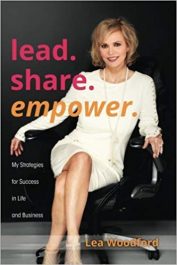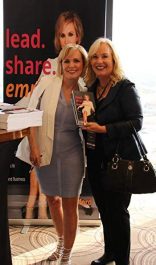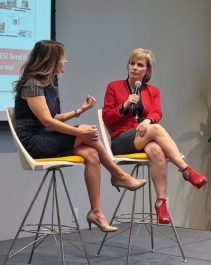How To Leverage A Book To Grow Your Business
A few years ago, I decided to make a shift in my business because traditional networking and traditional advertising were no longer a fit for my needs. I realized the necessity to rebrand to make my company a national brand vs a local brand. I had a few challenges to address because I lacked the current skill sets for today’s media, the contacts, and the personal brand, which was needed to compliment my new, national business brand. Addressing these issues and rebranding my company, I have since helped hundreds of speakers, authors, and entrepreneurs do the same.
My first book was “Lead… Share… Empower…My Strategies for Success in Life and Business”. In this article, I will go behind the scenes and share my strategies for leveraging my book to build and shift my business.
As a magazine publisher, I thought writing a book would be a piece of cake since I had written hundreds of articles over the years. It wasn’t as easy as I thought, and it required a complete marketing and sales strategy around the book. Writing my book afforded me multiple media appearances, speaking gigs, advertising clients and sponsors for SmartFem Summit. It also allowed me to position myself as an expert.
While my experience as a first time, self-published author was a good one, sadly that isn’t the case for most.
Know your end game
Before you put a word on paper, know what you want your outcome to be. For your book to have an impact, you must know who it will impact and how. So having a succinct marketing strategy and an identified target market is paramount.
 There’s a fine art to writing, marketing, cover design, title, and distribution as well as marketing and selling of a book. Simply writing a book does not guarantee people will buy it. However, knowing who you’re writing your book for and how you will get it to them, certainly improves your odds. You must always ask yourself why you’re writing the book? Your why is crucial because it must be bigger than your excuses. If writing a book was easy, everyone would do it.
There’s a fine art to writing, marketing, cover design, title, and distribution as well as marketing and selling of a book. Simply writing a book does not guarantee people will buy it. However, knowing who you’re writing your book for and how you will get it to them, certainly improves your odds. You must always ask yourself why you’re writing the book? Your why is crucial because it must be bigger than your excuses. If writing a book was easy, everyone would do it.
Books can provide great lead generation, visibility, credibility, and position you as an expert if the book is well thought out and is in alignment with your brand, expertise, and audience.
I am currently working on book number two which is a business book for speakers, authors, and entrepreneurs, on how to effectively market and build their businesses. One of the reasons I decided on this topic is because I have many people asking me questions such as, “How do you write a book?”, “How do you get speaking engagements and market your small business?”
I’m getting feedback from my Facebook Group, readers, and audience to find out what their struggles and concerns are. I’m involving my audience and getting their feedback and asking questions before creating my book because this ensures a captive audience. Non-fiction books that do well are books which solve problems or educate their readers. And, while writing your memoir is great, you may not have an audience for such a book.
I can’t express enough how important it is to write a book that your customer wants. Most authors want to write about their passion instead of doing their research and marketing strategy upfront. Writing a book requires a lot of time, energy and resources, so do yourself a favor and make sure you have a market for it before you go to the trouble of writing it.
When planning for your book, identify your readers upfront. You can find them and begin conversations with them at conferences, Facebook groups, LinkedIn and other social media platforms. Start building your platform so you can understand who they are and what their needs are so you can deliver a book they will read. The side benefit is that you will have content long before you begin to write the book.
Don’t re-invent the wheel
Writing my first book was difficult because I didn’t have all the strategies upfront, so it took longer and was more expensive than it needed to be. Consider what kind of books your target audience is reading and follow the format. Fortunately, I already had a target audience and it was a great positioning first book, so it worked out. However, I would have shortened my learning curve greatly had I patterned my book and marketing strategy after a best-selling book that was already in a similar market.
Make sure your book is original and has your unique value proposition. These other authors are simply a blueprint for marketing and organization as well as structure ideas for your book.
Hire Professionals
I look at hundreds of books for my Amazon Prime TV show, “Between the Lines”, and the biggest mistake I see is people skimping on the quality of their book. Your book must be properly edited, have a professional cover and the naming of the book should be in alignment with your audience and your business. I see too many people going cheap on cover design and editing and trust me, it will literally kill your book.
Leverage your Book
 Once you have completed the first three steps above, you can then start leveraging your book to build your business. I had several launch-parties that allowed me to get the word out about my book. I managed to get a large law firm as a client from my very first book launch and I’ve been on half a dozen TV shows and countless podcasts since.
Once you have completed the first three steps above, you can then start leveraging your book to build your business. I had several launch-parties that allowed me to get the word out about my book. I managed to get a large law firm as a client from my very first book launch and I’ve been on half a dozen TV shows and countless podcasts since.
Having a book has also led me to some fabulous speaking opportunities. Last year, I was flown to speak in front of five hundred realtors. In addition to my speaking fee, they purchased books for the audience, and I had a ten-day working vacation in Australia. My book has been a high classed business card and a value-add for new clients over the last two years.
Superstition Springs Lexus is my book sponsor. Yes, you heard me right, Lexus has been supporting and sponsoring my books for the last two years. As successful as my first book has been for me, I am extremely excited about the upcoming one because I’ve learned a great deal, built-up my platform, and have an even bigger and better strategy this time around.
In conclusion, leveraging a book is a great marketing strategy for speakers, authors, and entrepreneurs, but do your due diligence first.
















